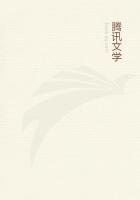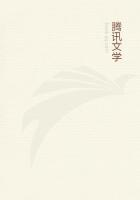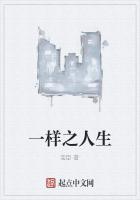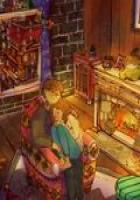1. The External Soul in Inanimate Things
THUS the idea that the soul may be deposited for a longer or shorter time in some place of security outside the body, or at all events in the hair, is found in the popular tales of many races. It remains to show that the idea is not a mere figment devised to adorn a tale, but is a real article of primitive faith, which has given rise to a corresponding set of customs.
We have seen that in the tales the hero, as a preparation for battle, sometimes removes his soul from his body, in order that his body may be invulnerable and immortal in the combat. With a like intention the savage removes his soul from his body on various occasions of real or imaginary peril. Thus among the people of Minahassa in Celebes, when a family moves into a new house, a priest collects the souls of the whole family in a bag, and afterwards restores them to their owners, because the moment of entering a new house is supposed to be fraught with supernatural danger. In Southern Celebes, when a woman is brought to bed, the messenger who fetches the doctor or the midwife always carries with him something made of iron, such as a chopping-knife, which he delivers to the doctor. The doctor must keep the thing in his house till the confinement is over, when he gives it back, receiving a fixed sum of money for doing so. The chopping-knife, or whatever it is, represents the woman's soul, which at this critical time is believed to be safer out of her body than in it. Hence the doctor must take great care of the object; for were it lost, the woman's soul would assuredly, they think, be lost with it.
Among the Dyaks of Pinoeh, a district of South-eastern Borneo, when a child is born, a medicine-man is sent for, who conjures the soul of the infant into half a coco-nut, which he thereupon covers with a cloth and places on a square platter or charger suspended by cords from the roof. This ceremony he repeats at every new moon for a year. The intention of the ceremony is not explained by the writer who describes it, but we may conjecture that it is to place the soul of the child in a safer place than its own frail little body.
This conjecture is confirmed by the reason assigned for a similar custom observed elsewhere in the Indian Archipelago. In the Kei Islands, when there is a newly-born child in a house, an empty coco-nut, split and spliced together again, may sometimes be seen hanging beside a rough wooden image of an ancestor. The soul of the infant is believed to be temporarily deposited in the coco-nut in order that it may be safe from the attacks of evil spirits; but when the child grows bigger and stronger, the soul will take up its permanent abode in its own body. Similarly among the Esquimaux of Alaska, when a child is sick, the medicine-man will sometimes extract its soul from its body and place it for safe-keeping in an amulet, which for further security he deposits in his own medicine-bag. It seems probable that many amulets have been similarly regarded as soul-boxes, that is, as safes in which the souls of the owners are kept for greater security. An old Mang'anje woman in the West Shire district of British Central Africa used to wear round her neck an ivory ornament, hollow, and about three inches long, which she called her life or soul. Naturally, she would not part with it; a planter tried to buy it of her, but in vain. When Mr. James Macdonald was one day sitting in the house of a Hlubi chief, awaiting the appearance of that great man, who was busy decorating his person, a native pointed to a pair of magnificent ox-horns, and said, Ntame has his soul in these horns. The horns were those of an animal which had been sacrificed, and they were held sacred. A magician had fastened them to the roof to protect the house and its inmates from the thunder-bolt.
The idea, adds Mr. Macdonald, is in no way foreign to South African thought. A man's soul there may dwell in the roof of his house, in a tree, by a spring of water, or on some mountain scaur. Among the natives of the Gazelle Peninsula in New Britain there is a secret society which goes by the name of Ingniet or Ingiet. On his entrance into it every man receives a stone in the shape either of a human being or of an animal, and henceforth his soul is believed to be knit up in a manner with the stone. If it breaks, it is an evil omen for him; they say that the thunder has struck the stone and that he who owns it will soon die. If nevertheless the man survives the breaking of his soul-stone, they say that it was not a proper soul-stone and he gets a new one instead. The emperor Romanus Lecapenus was once informed by an astronomer that the life of Simeon, prince of Bulgaria, was bound up with a certain column in Constantinople, so that if the capital of the column were removed, Simeon would immediately die. The emperor took the hint and removed the capital, and at the same hour, as the emperor learned by enquiry, Simeon died of heart disease in Bulgaria.
Again, we have seen that in folk-tales a man's soul or strength is sometimes represented as bound up with his hair, and that when his hair is cut off he dies or grows weak. So the natives of Amboyna used to think that their strength was in their hair and would desert them if it were shorn. A criminal under torture in a Dutch Court of that island persisted in denying his guilt till his hair was cut off, when he immediately confessed. One man, who was tried for murder, endured without flinching the utmost ingenuity of his torturers till he saw the surgeon standing with a pair of shears. On asking what this was for, and being told that it was to cut his hair, he begged they would not do it, and made a clean breast. In subsequent cases, when torture failed to wring a confession from a prisoner, the Dutch authorities made a practice of cutting off his hair.


